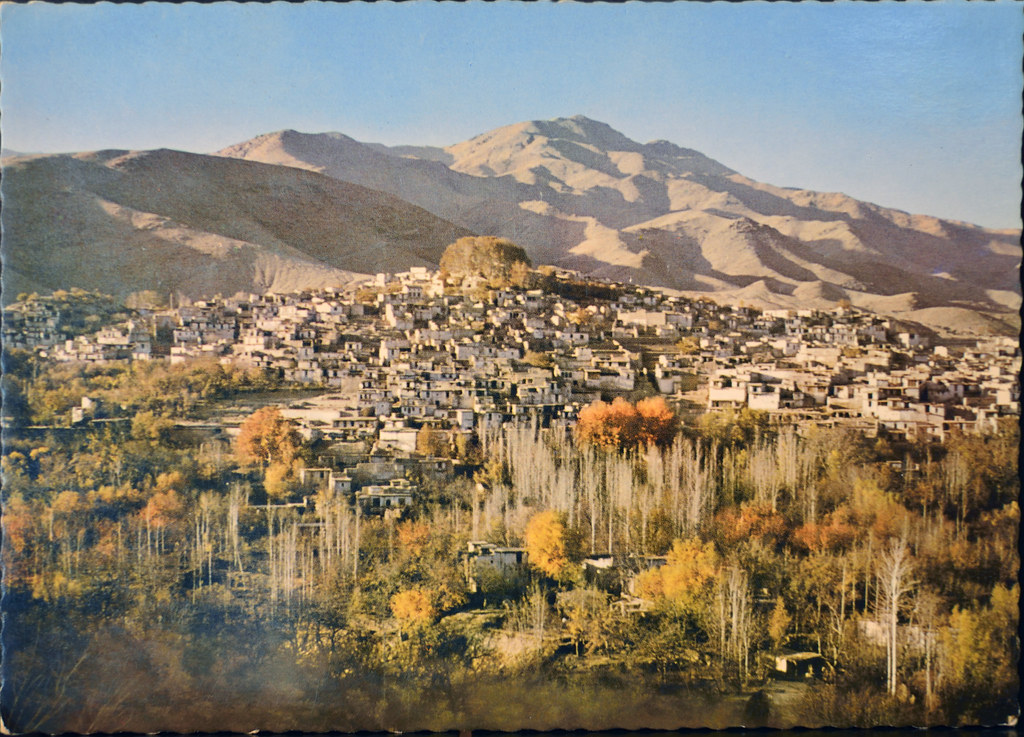
Photo of Istalif area
Istalif, outside of Kabul, was famous for its blue glass artisans, and its beautiful blue pottery. Maybe it still is. I don’t know – my memories are of bulky azure glasses, and thick strands of cerulean beads that jingled on the camel harnesses, and occasionally the wrists, of nomadic Kootchi women passing through Kabul, where I lived as a teenager, in caravans. My father worked for U.S. A.I.D., and I attended an international school in Kabul.
In the late spring, waters rushed down in cold, lively streams from fierce mountains still snow-clad, and many westerners went to Istalif to sight-see. An exclusive restaurant catering to foreigners afforded a good view with coffee and croissants.

Debbie Simon (my best friend) and I were, like all 16 year olds, eager to get away from the boring conversations of our elders. Dressed in our French coats, our high black boots and mod turtlenecks, with adolescent stealth we escaped the tabled terraces for a while, to walk below on grey granite boulders that overlooked a stream of cold spring water.We were young, fashionable, and elated with the prospect of leaving Afghanistan. Debbie was headed home to New York, and I was going to "swinging London".
Debbie’s father worked for the Embassy, mine was with AID, both had completed their assignments, and we were going back to the states at last.To the Rolling Stones and boys and beaches and college. As we talked excitedly, not so far away was a familiar sight – a group of local women doing laundry by the stream. Seeing us approach, they had dropped their chadoris over their faces, and now resembled a collection of multi-colored tents huddled among the grey rocks.
In the late spring, waters rushed down in cold, lively streams from fierce mountains still snow-clad, and many westerners went to Istalif to sight-see. An exclusive restaurant catering to foreigners afforded a good view with coffee and croissants.

Debbie Simon (my best friend) and I were, like all 16 year olds, eager to get away from the boring conversations of our elders. Dressed in our French coats, our high black boots and mod turtlenecks, with adolescent stealth we escaped the tabled terraces for a while, to walk below on grey granite boulders that overlooked a stream of cold spring water.We were young, fashionable, and elated with the prospect of leaving Afghanistan. Debbie was headed home to New York, and I was going to "swinging London".
Debbie’s father worked for the Embassy, mine was with AID, both had completed their assignments, and we were going back to the states at last.To the Rolling Stones and boys and beaches and college. As we talked excitedly, not so far away was a familiar sight – a group of local women doing laundry by the stream. Seeing us approach, they had dropped their chadoris over their faces, and now resembled a collection of multi-colored tents huddled among the grey rocks.
I didn’t notice when one “tent” disengaged from the rest and quietly approached us.But we grew silent as she stood, silently, before us, her face hidden under layers of pleated cloth, an opaque net before her eyes.Hands emerged from the chador to lift it above her face, and before us stood a girl of 16 or 17. Black eyes lined in kohl shone with humor.She smiled shyly at each of us as she lifted her veil, dropped it before her face again, turned and walked back to the group of veiled women as Debbie and I stood silently on our rock by the stream.
I don't know why she approached us. Perhaps she just wanted to let us know that she also was young and pretty, reminding us of our common youth, and yet living in worlds so far apart. I never forgot that moment - it was a gift. I also never have forgotten the enormous privilege my life has been.
No comments:
Post a Comment